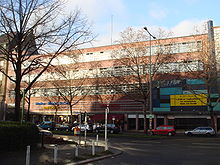1986 Berlin discotheque bombing
| 1986 West Berlin discotheque bombing | |
|---|---|
| Part of Terrorism in Germany | |

Roxy-Palast, the building in which the discotheque La Belle was located
|
|
| Location | West Berlin |
| Coordinates | 52°28′23″N 13°20′12″E / 52.47306°N 13.33667°E |
| Date | April 5, 1986 1:45 am (CET/CEST) |
|
Attack type
|
Bombing |
| Weapons | Plastic explosive |
| Deaths | 3 (2 US soldiers, 1 Turkish civilian) |
|
Non-fatal injuries
|
229 |
| Perpetrators | Verena Chanaa, Yasir Shraydi, Musbah Eter, Ali Chanaa |
On 5 April 1986, three people were killed and around 230 injured when La Belle discothèque was bombed in West Berlin. The entertainment venue was commonly frequented by United States soldiers, and two of the dead and 79 of the injured were American servicemen.
A bomb placed under a table near the disc jockey's booth exploded at 01:45 CET, instantly killing Nermin Hannay, a Turkish woman, and US Army sergeant Kenneth T. Ford. A second US Army sergeant, James E. Goins, died from his injuries two months later. Some of the victims were left permanently disabled due to the injuries caused by the explosion.
Libya was accused by the US government of sponsoring the bombing, and US President Ronald Reagan ordered retaliatory strikes on Tripoli and Benghazi in Libya ten days later. The strikes reportedly killed 15–30 people, and were condemned by the United Nations General Assembly.
A 2001 trial in the US found that the bombing had been "planned by the Libyan secret service and the Libyan Embassy."
Libya was blamed for the bombing after Telex messages from Tripoli to the country's embassy in East Berlin congratulating them on a job well done were intercepted. President Ronald Reagan retaliated by ordering airstrikes against the Libyan capital of Tripoli and city of Benghazi (see Operation El Dorado Canyon). At least 30 soldiers and 15 civilians were killed.
In spite of reports blaming Libya for the attack on the nightclub, no individual was officially accused of the bombing until the 1990 reunification of Germany and the subsequent opening up of the Stasi archives. Stasi files led German prosecutor Detlev Mehlis to Musbah Abdulghasem Eter, a Libyan who had worked at the Libyan embassy in East Berlin. Stasi files listed him as an agent, and Mehlis said he was the Libyan spy agency's main contact at the embassy.
...
Wikipedia
